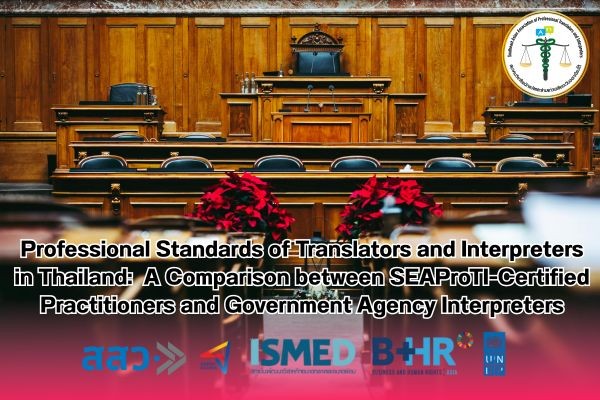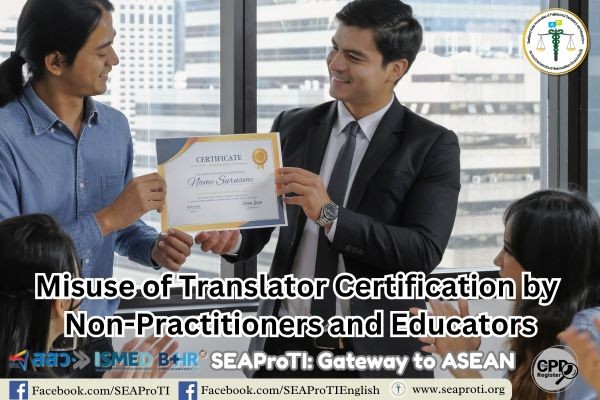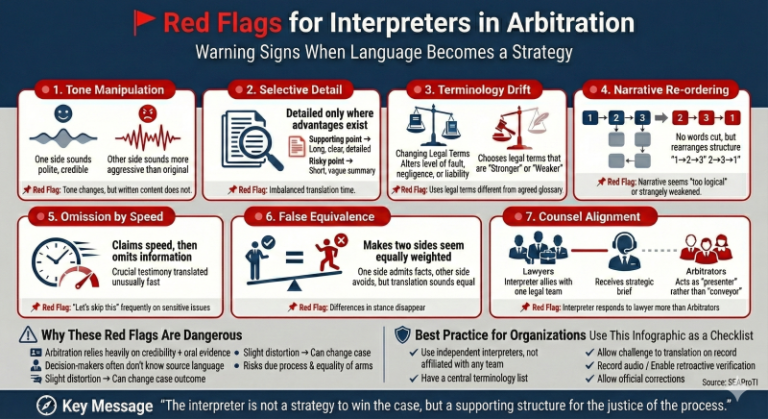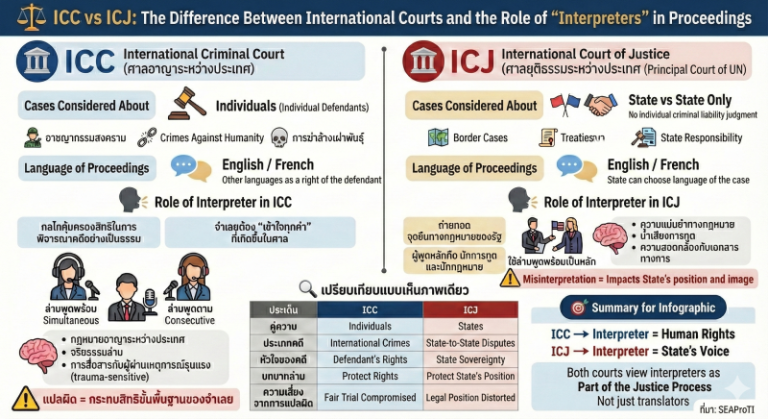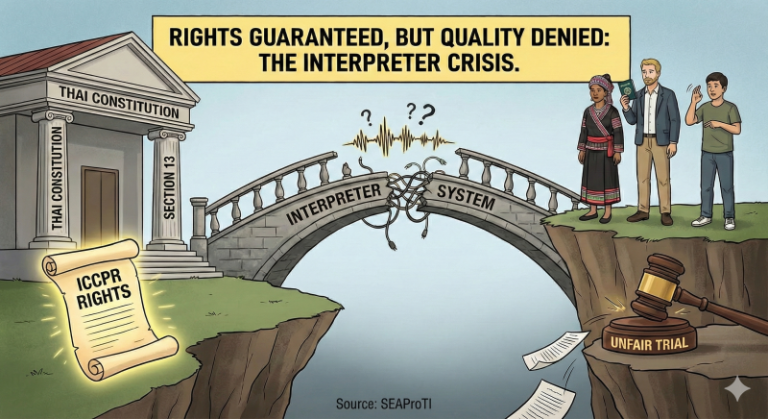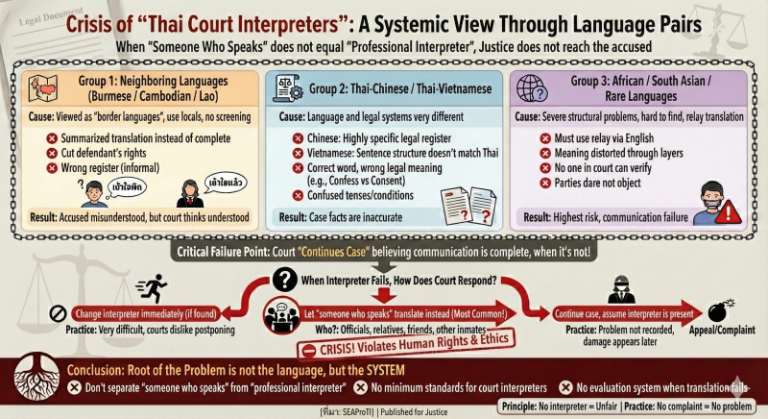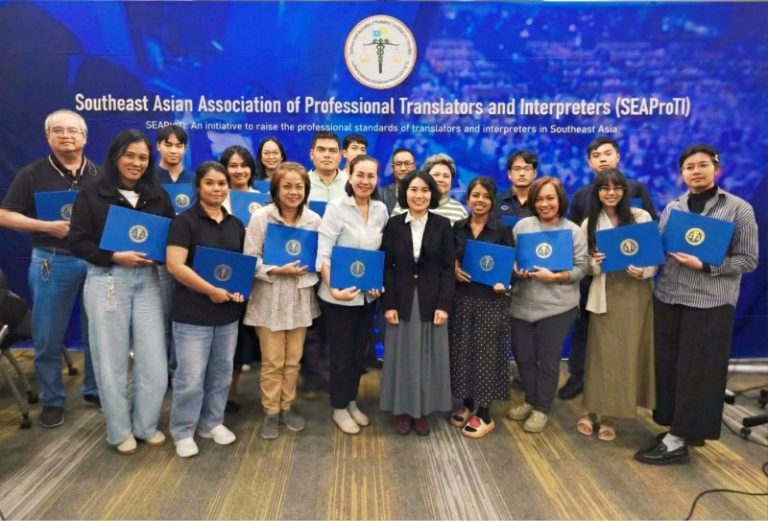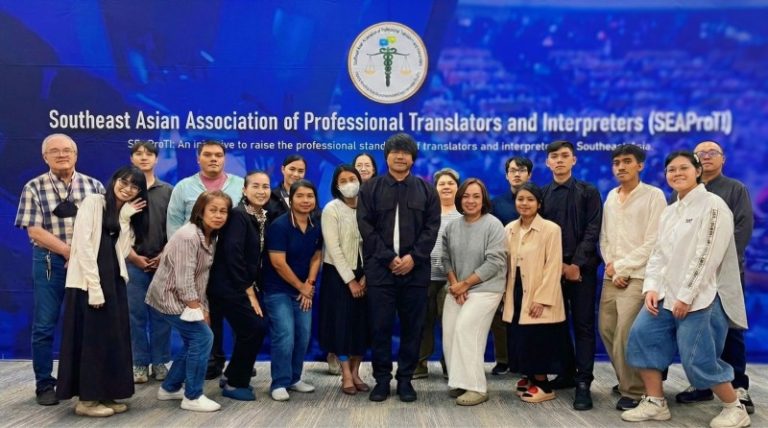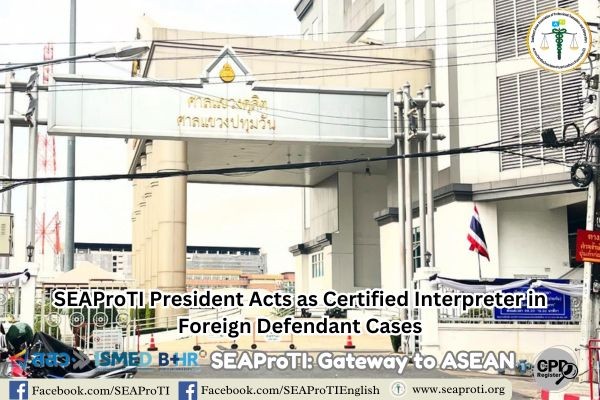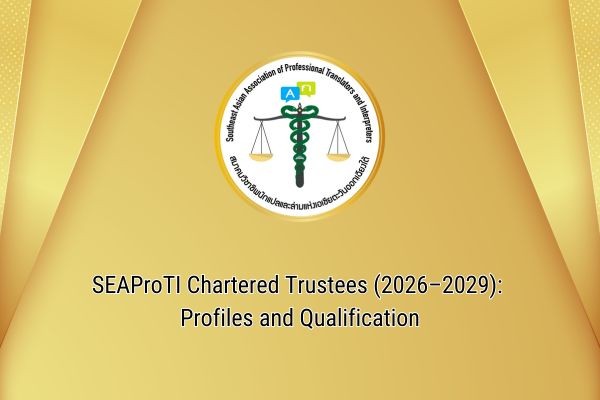Professional Standards of Translators and Interpreters in Thailand:
A Comparison between SEAProTI-Certified Practitioners and Government Agency Interpreters
16 August 2025, Bangkok – Translation and interpreting in judicial proceedings are essential mechanisms for safeguarding human rights, particularly in criminal cases, investigations, and trials. Miscommunication can result in wrongful judgments and constitute direct violations of human rights (González, Vásquez, & Mikkelson, 2012). In Thailand, however, the reliance on interpreters from government agencies who have not undergone rigorous training or certification often leads to high levels of inaccuracy. This stands in contrast to certified practitioners of the Southeast Asian Association of Professional Translators and Interpreters (SEAProTI), who are accredited under international standards.
Professional Ethics and Impartiality
Translators and interpreters of SEAProTI are the only group in Thailand bound by a formal commitment to uphold a professional code of ethics. This framework prevents misconduct such as:
- soliciting extra money from defendants or foreign clients,
- exerting undue pressure, or
- breaching confidentiality.
In contrast, some government-employed interpreters receive less than 6,000 THB per day, which creates incentives for unethical practices, including demanding additional payment from clients (Hale, 2015). This discrepancy highlights the unsustainable nature of the current remuneration system and its implications for impartiality.
Linguistic Competence and Continuous Professional Development
SEAProTI-certified practitioners must undergo standardized examinations, rigorous training, and continuing professional development (CPD) in line with international practices such as NAATI in Australia (Corsellis, 2008). As a result, SEAProTI members consistently demonstrate high-level linguistic competence, the ability to comprehend fully, and to convey messages accurately and completely.
By contrast, interpreters recruited by government agencies are often novices or individuals with partial language skills, assigned to critical cases without sufficient training in legal language or ethics. This results in a high risk of inaccuracies (Berk-Seligson, 2017), which in turn can lead to unjust judgments and miscarriages of justice.
Impact on Human Rights
Inaccurate interpreting directly undermines fundamental human rights, including:
- The right to a fair trial, under Article 14 of the International Covenant on Civil and Political Rights (ICCPR), to which Thailand is a State Party.
- The right of defendants to understand charges and communicate with legal counsel (ICCPR, Article 14.3(a),(f)).
- Protection against discrimination, since poor interpreting disproportionately affects foreigners and linguistic minorities.
- Such failures not only erode the credibility of the Thai judicial system but also constitute violations of international human rights obligations (United Nations, 2016).
Remuneration and Sustainability
SEAProTI establishes fair and balanced remuneration standards—neither exploitatively low nor excessively high—that ensure interpreters are properly compensated without creating a financial burden for clients. This prevents issues such as fraud, hidden fees, or contract breaches. In contrast, government interpreters who are underpaid often resort to soliciting additional income from defendants or foreign clients (Kelly, 2008).
Conclusion
The use of SEAProTI-certified translators, certification providers, and interpreters demonstrates three key advantages:
- Adherence to a strict professional code of ethics and impartiality.
- High-level linguistic competence and continuous training.
- Fair and sustainable remuneration practices.
Conversely, reliance on uncertified government interpreters increases the risks of linguistic inaccuracies, unfair trials, and violations of human rights. Policy reform that integrates SEAProTI’s standards into Thailand’s justice system would therefore enhance the credibility and fairness of judicial processes.
References
- Berk-Seligson, S. (2017). The bilingual courtroom: Court interpreters in the judicial process. University of Chicago Press.
- Corsellis, A. (2008). Public service interpreting: The first steps. Palgrave Macmillan.
- González, R. D., Vásquez, V. F., & Mikkelson, H. (2012). Fundamentals of court interpretation: Theory, policy, and practice. Carolina Academic Press.
- Hale, S. (2015). Community interpreting. Routledge.
- Kelly, N. (2008). A voice for non-English speakers: Court interpreters and the pursuit of justice. Multilingual Matters.
- United Nations. (2016). International Covenant on Civil and Political Rights (ICCPR). United Nations Human Rights Office of the High Commissioner.
About Certified Translators, Translation Certification Providers, and Certified Interpreters of SEAProTI
The Southeast Asian Association of Professional Translators and Interpreters (SEAProTI) has published the criteria and qualifications for registering as “Certified Translators,” “Translation Certification Providers,” and “Certified Interpreters” of the Association under Sections 9 and 10 of the Royal Gazette, Secretariat of the Cabinet, Prime Minister’s Office, Kingdom of Thailand, dated 25 July 2024, Vol. 141, Part 66 Ng, p. 100. Full text available at: The Royal Thai Government Gazette
SEAProTI is the first professional association in Thailand and Southeast Asia with a formal certification system for Certified Translators, Translation Certification Providers, and Certified Interpreters.
Head Office: Baan Ratchakhru Building, No. 33, Room 402, Soi Phahonyothin 5, Phahonyothin Road, Phaya Thai Subdistrict, Phaya Thai District, Bangkok 10400, Thailand. Email: hello@seaproti.com Tel: (+66) 2-114-3128 (Office hours: Mon–Fri, 9:00–17:00)
มาตรฐานวิชาชีพนักแปลและล่ามในประเทศไทย: การเปรียบเทียบระหว่างผู้เชี่ยวชาญที่ได้รับการรับรองจาก SEAProTI และล่ามของหน่วยงานรัฐ
16 สิงหาคม 2568, กรุงเทพมหานคร – การแปลและการล่ามในกระบวนการยุติธรรมเป็นกลไกสำคัญในการคุ้มครองสิทธิมนุษยชน โดยเฉพาะในคดีอาญา การสืบสวน และกระบวนการพิจารณาคดี การสื่อสารที่ผิดพลาดอาจส่งผลให้เกิดการตัดสินที่ไม่เป็นธรรม และเป็นการละเมิดสิทธิมนุษยชนโดยตรง (González, Vásquez, & Mikkelson, 2012) อย่างไรก็ตาม ในประเทศไทย การใช้ล่ามจากหน่วยงานรัฐที่มิได้ผ่านการอบรมเชิงลึกหรือการรับรองมาตรฐาน มักนำไปสู่ความคลาดเคลื่อนสูง ต่างจากนักวิชาชีพของสมาคมวิชาชีพนักแปลและล่ามแห่งเอเชียตะวันออกเฉียงใต้ (SEAProTI) ที่ได้รับการรับรองตามมาตรฐานสากล
จรรยาบรรณวิชาชีพและความเป็นกลาง
นักแปลและล่ามของ SEAProTI เป็นกลุ่มเดียวในประเทศไทยที่ลงนามผูกพันว่าจะปฏิบัติตาม จรรยาบรรณวิชาชีพ อย่างเคร่งครัด ทำให้การละเมิดจรรยาบรรณ เช่น การเรียกรับเงินเพิ่มจากผู้ต้องหา หรือการกดดันลูกค้าด้วยวิธีมิชอบ ไม่เกิดขึ้น ตรงกันข้าม ล่ามของหน่วยงานรัฐบางรายได้รับค่าตอบแทนต่ำกว่า 6,000 บาทต่อวัน จึงมีแรงจูงใจในการหาผลประโยชน์อื่น ๆ (Hale, 2015) ปัญหานี้สะท้อนถึงความไม่ยั่งยืนของระบบค่าตอบแทนและอาจกระทบต่อความเป็นกลาง
ความเชี่ยวชาญด้านภาษาและการฝึกอบรมต่อเนื่อง
นักวิชาชีพของ SEAProTI ต้องผ่านการอบรมและการสอบคัดกรองที่ได้มาตรฐาน รวมถึงมีการพัฒนาความรู้ต่อเนื่อง (CPD) ตามแบบอย่างในประเทศพัฒนาแล้ว เช่น NAATI ในออสเตรเลีย (Corsellis, 2008) การฝึกอบรมดังกล่าวทำให้นักวิชาชีพของ SEAProTI มีระดับภาษาสูง ฟังออกครบถ้วน และถ่ายทอดสารได้เต็มถ้อยคำ
ในขณะที่ล่ามของหน่วยงานรัฐจำนวนมากมักเป็น ล่ามมือใหม่ หรือแค่มีทักษะด้านภาษาในระดับหนึ่งหรือพอแปลได้ จึงถูกนำมาใช้งานในคดีสำคัญโดยปราศจากการฝึกอบรมด้านนิติศาสตร์และจริยธรรม ทำให้เกิด ความคลาดเคลื่อนสูง (Berk-Seligson, 2017) และอาจนำไปสู่การตัดสินที่ไม่สอดคล้องกับข้อเท็จจริง
ผลกระทบต่อสิทธิมนุษยชน
- การล่ามแปลที่ผิดพลาดอาจส่งผลกระทบต่อสิทธิมนุษยชนหลายประการ ได้แก่:
- สิทธิในการพิจารณาคดีอย่างเป็นธรรม (Fair Trial Rights) ตามมาตรา 14 ของกติการะหว่างประเทศว่าด้วยสิทธิพลเมืองและสิทธิทางการเมือง (ICCPR) ที่ไทยเป็นภาคี
- สิทธิของผู้ต้องหาในการเข้าใจข้อกล่าวหา และสามารถสื่อสารกับทนายความ (ICCPR, Article 14.3(a),(f))
- การคุ้มครองจากการเลือกปฏิบัติ หากล่ามไม่มีความสามารถ อาจส่งผลให้ชาวต่างชาติหรือผู้พูดภาษาส่วนน้อยเสียเปรียบ
- กรณีเหล่านี้ไม่เพียงแต่ทำลายความน่าเชื่อถือของระบบยุติธรรมไทย แต่ยังถือเป็น การละเมิดสิทธิมนุษยชน ตามพันธกรณีระหว่างประเทศที่ไทยต้องปฏิบัติตาม (United Nations, 2016)
ค่าตอบแทนและความยั่งยืน
SEAProTI ได้จัดวาง มาตรฐานค่าตอบแทนที่สมเหตุสมผล ซึ่งไม่ต่ำจนบีบบังคับให้ล่ามต้องหาทางหารายได้เพิ่ม และไม่สูงจนเป็นภาระต่อลูกค้า ความสมดุลนี้ช่วยลดปัญหาการโกง การเรียกเงินเพิ่ม หรือการผิดสัญญา ซึ่งเป็นปัญหาที่เกิดขึ้นกับล่ามของรัฐในหลายกรณี (Kelly, 2008)
สรุป
- การใช้บริการนักแปลรับรอง ผู้รับรองการแปล และล่ามรับรองของ SEAProTI มีข้อดีที่เด่นชัดในสามประการหลัก คือ
- ความเคร่งครัดในจรรยาบรรณและความเป็นกลาง
- ระดับภาษาที่สูงและการฝึกอบรมอย่างต่อเนื่อง
- ระบบค่าตอบแทนที่เป็นธรรมและยั่งยืน
- ในขณะที่การใช้ล่ามของหน่วยงานรัฐที่ไม่ผ่านการรับรอง กลับเพิ่มความเสี่ยงต่อ ความคลาดเคลื่อนทางภาษา การพิจารณาคดีที่ไม่เป็นธรรม และการละเมิดสิทธิมนุษยชน ดังนั้น การปฏิรูปเชิงนโยบายโดยบูรณาการมาตรฐานของ SEAProTI จึงเป็นแนวทางที่ควรพิจารณาเพื่อยกระดับความน่าเชื่อถือของกระบวนการยุติธรรมไทย
เอกสารอ้างอิง
- Berk-Seligson, S. (2017). The bilingual courtroom: Court interpreters in the judicial process. University of Chicago Press.
- Corsellis, A. (2008). Public service interpreting: The first steps. Palgrave Macmillan.
- González, R. D., Vásquez, V. F., & Mikkelson, H. (2012). Fundamentals of court interpretation: Theory, policy, and practice. Carolina Academic Press.
- Hale, S. (2015). Community interpreting. Routledge.
- Kelly, N. (2008). A voice for non-English speakers: Court interpreters and the pursuit of justice. Multilingual Matters.
- United Nations. (2016). International Covenant on Civil and Political Rights (ICCPR). United Nations Human Rights Office of the High Commissioner.
เกี่ยวกับนักแปลรับรอง ผู้รับรองการแปล และล่ามรับรองของสมาคมวิชาชีพนักแปลและล่ามแห่งเอเชียตะวันออกเฉียงใต้
สมาคมวิชาชีพนักแปลและล่ามแห่งเอเชียตะวันออกเฉียงใต้ (SEAProTI) ได้ประกาศหลักเกณฑ์และคุณสมบัติผู้ที่ขึ้นทะเบียนเป็น “นักแปลรับรอง (Certified Translators) และผู้รับรองการแปล (Translation Certification Providers) และล่ามรับรอง (Certified Interpreters)” ของสมาคม หมวดที่ 9 และหมวดที่ 10 ในราชกิจจานุเบกษา ของสำนักเลขาธิการคณะรัฐมนตรี ในสำนักนายกรัฐมนตรี แห่งราชอาณาจักรไทย ลงวันที่ 25 ก.ค. 2567 เล่มที่ 141 ตอนที่ 66 ง หน้า 100 อ่านฉบับเต็มได้ที่: นักแปลรับรอง ผู้รับรองการแปล และล่ามรับรอง
*สมาคมวิชาชีพนักแปลและล่ามแห่งเอเชียตะวันออกเฉียงใต้ เป็นสมาคมวิชาชีพแห่งแรกในประเทศไทยและภูมิภาคเอเชียตะวันออกเฉียงใต้ที่มีระบบรับรองนักแปลรับรอง ผู้รับรองการแปล และล่ามรับรอง
สำนักงานใหญ่: อาคารบ้านราชครู เลขที่ 33 ห้อง 402 ซอยพหลโยธิน 5 ถนนพหลโยธิน แขวงพญาไท เขตพญาไท กรุงเทพมหานคร 10400
อีเมล: hello@seaproti.com โทรศัพท์: (+66) 2-114-3128 (เวลาทำการ: วันจันทร์–วันศุกร์ เวลา 9.00–17.00 น.)


